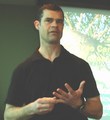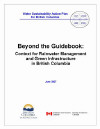Develop with Care: Environmental Guidelines for Urban and Rural Land Development in British Columbia

“While its primary purpose is to provide province-wide guidelines, Develop with Care also provides information on ways that environmental protection and stewardship can benefit the community, the property owner and the developer, as well as the natural environment,” stated Marlene Caskey.



 “We are using the slogan The New Business As Usual to convey the message that, for change to really occur, practices that until now have been viewed as the exception must become the norm moving forward. We have to build regulatory models and develop models of practice and expertise,” stated Dale Wall, Deputy Minister.
“We are using the slogan The New Business As Usual to convey the message that, for change to really occur, practices that until now have been viewed as the exception must become the norm moving forward. We have to build regulatory models and develop models of practice and expertise,” stated Dale Wall, Deputy Minister.


